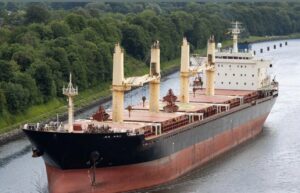Greek shipowners are set to play a key role in the development of nuclear for the maritime sector. The commitment was clear at ARGO: New Nuclear for Greek Maritime, held in Athens last week, where leading shipowners and operators gathered to discuss the sector’s rapid development.
Christopher J. Wiernicki, chairman and CEO of the American Bureau of Shipping (ABS), underscored nuclear’s potential as a long-term solution for the sector.
“Nuclear energy is no longer a distant possibility for maritime applications, it is emerging as a legitimate, practical, and scalable solution for a wide range of strategic uses. It is a credible long-term solution, not simply because of its potential to reduce emissions, but because it offers unmatched energy density, reliability, and strategic independence.”
At the Summit, over 120 high-level industry leaders welcomed the increasing pace of development to bring nuclear for maritime to both commercial shipping and floating nuclear power plants (FNPPs).
Opening the conference Charlotte Vere, group head market development for CORE POWER, highlighted the unique position of Greece in shaping the nuclear future of shipping.
“For generations, Greek shipowners have led the industry at pivotal moments in the history of shipping, leveraging their collective expertise, innovation and resilience. Now we are at another inflection point, as the industry strives to deliver improved efficiencies in the face of carbon and other emission levies.”
“We are so pleased that the innovators in the Greek shipping industry are working with us and other leading industry players on pathways to deliver nuclear for maritime,” said Charlotte.
CORE POWER, ABS Hellas, and ATHLOS Energy are jointly exploring the potential of deploying FNPPs in the Mediterranean Sea.
The joint effort will assess how floating nuclear, powered by small modular reactors, can address growing energy demand in remote and coastal areas of the Mediterranean.
This includes supplying grid-scale electricity to islands, supporting zero-emission port operations, and powering desalination plants to provide potable water in drought-affected regions.
“Applications based on maritime assets will begin with floating power barges because they will be more straightforward to design, build, and operate. Because these types of applications will be based in a single location at a time, the regulatory approvals required may be easier to achieve compared to vessels operating across multiple geographies and jurisdictions,” said Wiernicki. “Floating nuclear-powered data centers are a prime example of this opportunity. By 2050, we anticipate that floating nuclear-powered data centers could capture up to 10 percent of the global market. In the U.S. alone, this would mean nine total facilities. While the market cap is still evolving, projections estimate the total data center market volume will reach $212 billion by 2029. This is not a niche opportunity; it is a strategic growth vector.”
He highlighted that commercial nuclear corridors will be key to the adoption of nuclear propulsion.
Wiernicki said: “Vessels powered by small modular reactors are likely to operate initially on narrowly defined corridors between two countries with favorable acceptance of nuclear power and with mature regulatory oversight agencies.
“Commercial nuclear corridors can be the foundational infrastructure we need to unlock the full potential of nuclear technology in commercial shipping, enabling safe deployment, regulatory alignment, and scalable integration across energy, data, and logistics ecosystems.”
Earlier this year, the head of the International Atomic Energy Agency (IAEA) Rafael Mariano Grossi met the Union of Greek Shipowners (UGS) in Athens. The discussions were focused on how nuclear science and technology can help decarbonise one of the world’s most critical sectors, shipping.



